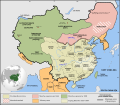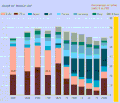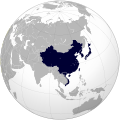The Asia Portal
Asia AY -zhəAY -shəcontinent in the world by both land area and population. It covers an area of more than 44 million square kilometres, about 30% of Earth's total land area and 8% of Earth's total surface area. The continent, which has long been home to the majority of the human population , was the site of many of the first civilisations . Its 4.7 billion people constitute roughly 60% of the world's population.
Asia shares the landmass of Eurasia with Europe , and of Afro-Eurasia with both Europe and Africa . In general terms, it is bounded on the east by the Pacific Ocean , on the south by the Indian Ocean , and on the north by the Arctic Ocean . The border of Asia with Europe is a historical and cultural construct , as there is no clear physical and geographical separation between them. A commonly accepted division places Asia to the east of the Suez Canal separating it from Africa; and to the east of the Turkish straits , the Ural Mountains and Ural River , and to the south of the Caucasus Mountains and the Caspian and Black seas, separating it from Europe.
Since the concept of Asia derives from the term for the eastern region from a European perspective, Asia is the remaining vast area of Eurasia minus Europe. Therefore, Asia is a region where various independent cultures coexist rather than sharing a single culture, and its boundary with Europe is somewhat arbitrary and has moved since its first conception in classical antiquity . The division of Eurasia into two continents reflects East–West cultural differences, some of which vary on a spectrum. (Full article...
Featured article
Afghanistan Islamic Emirate of Afghanistan , is a landlocked country located at the crossroads of Central Asia and South Asia . It is bordered by Pakistan to the east and south , Iran to the west , Turkmenistan to the northwest , Uzbekistan to the north , Tajikistan to the northeast , and China to the northeast and east . Occupying 652,864 square kilometers (252,072 sq mi) of land, the country is predominantly mountainous with plains in the north and the southwest , which are separated by the Hindu Kush mountain range. Kabul is the country's capital and largest city. Afghanistan's population is estimated to be between 36 and 50 million.
Human habitation in Afghanistan dates to the Middle Paleolithic era. Popularly referred to as the graveyard of empires , the land has witnessed numerous military campaigns , including those by the Persians , Alexander the Great , the Maurya Empire , Arab Muslims , the Mongols , the British , the Soviet Union , and a US-led coalition . Afghanistan also served as the source from which the Greco-Bactrians and the Mughals , among others, rose to form major empires. Because of the various conquests and periods in both the Iranian and Indian cultural spheres, the area was a center for Zoroastrianism , Buddhism, Hinduism, and later Islam. The modern state of Afghanistan began with the Durrani Afghan Empire in the 18th century, although Dost Mohammad Khan is sometimes considered to be the founder of the first modern Afghan state . Afghanistan became a buffer state in the Great Game between the British Empire and the Russian Empire . From India, the British attempted to subjugate Afghanistan but were repelled in the First Anglo-Afghan War ; the Second Anglo-Afghan War saw a British victory. Following the Third Anglo-Afghan War in 1919, Afghanistan became free of foreign political hegemony, and emerged as the independent Kingdom of Afghanistan in 1926. This monarchy lasted almost half a century, until Zahir Shah was overthrown in 1973 , following which the Republic of Afghanistan was established. (Full article...
Muhammad Ali Jinnah Mahomedali Jinnahbhai ; 25 December 1876 – 11 September 1948) was a barrister, politician, and the founder of Pakistan . Jinnah served as the leader of the All-India Muslim League from 1913 until the inception of Pakistan on 14 August 1947 and then as Pakistan 's first governor-general until his death .
Born at Wazir Mansion in Karachi , Jinnah was trained as a barrister at Lincoln's Inn in London , England . Upon his return to India , he enrolled at the Bombay High Court , and took an interest in national politics, which eventually replaced his legal practice. Jinnah rose to prominence in the Indian National Congress in the first two decades of the 20th century. In these early years of his political career, Jinnah advocated Hindu–Muslim unity , helping to shape the 1916 Lucknow Pact between the Congress and the All-India Muslim League, in which Jinnah had also become prominent. Jinnah became a key leader in the All-India Home Rule League , and proposed a fourteen-point constitutional reform plan to safeguard the political rights of Muslims in the Indian subcontinent . In 1920, however, Jinnah resigned from the Congress when it agreed to follow a campaign of satyagraha political anarchy . (Full article...
The following are images from various Asia-related articles on Wikipedia.
Image 1 Robert Clive and
Mir Jafar after the
Battle of Plassey , 1757 by Francis Hayman (from
History of Asia )
Image 2 Gojong (1852–1919), the 26th king of
Joseon dynasty and the first emperor of
Korean Empire . (from
History of Asia )
Image 4 Daily life of people from the
Song period at the capital, Bianjing, today's
Kaifeng (from
History of Asia )
Image 5 Đại Việt ,
Champa ,
Angkor Empire and their neighbours, late 13th century (from
History of Asia )
Image 6 Daian-ji temple at Nara, Japan (from
Culture of Asia )
Image 8 The Qing Empire in 1832. (from
History of Asia )
Image 10 Political map of Asia in 1860 (from
History of Asia )
Image 11 Chicken tikka , a well-known dish across the globe, reflects the South Asian cooking style. (from
Culture of Asia )
Image 12 Language families in South Asia (from
Culture of Asia )
Image 15 The
Silk Road in Asia (from
History of Asia )
Image 16 The
Taipei 101 skyscraper in
Taipei , Taiwan, which was the tallest building in the world from 2004 to 2010 (from
Asian Century )
Image 17 A typical example of
Dravidian architecture (from
Culture of Asia )
Image 18 Deoksugung , the palace where Emperor Gojong established
Korean Empire . (from
History of Asia )
Image 19 Map of Asia for early 20th century (from
History of Asia )
Image 20 The Great Wave off Kanagawa ,
c. 1830 by
Hokusai , an example of art flourishing in the Edo Period (from
History of Asia )
Image 22 A stone image of the
Buddha (from
Culture of Asia )
Image 23 British troops taking
Zhenjiang from Qing troops (from
History of Asia )
Image 24 Ancient ziggurat, Iraq (from
Culture of Asia )
Image 25 The
Han dynasty and main polities in Asia c. 200 BC (from
History of Asia )
Image 26 Korean peninsula in 476 AD. There are three kingdoms and Gaya Union in the picture. This picture shows the heyday of
Goguryeo (from
History of Asia )
Image 27 Some
henges at
Göbekli Tepe in
Turkey were erected as far back as
9600 BC , predating those of
Stonehenge , by over seven millennia. (from
History of Asia )
Image 28 Projected shares of global GDP by region to 2050 (from
Asian Century )
Image 29 Dome of the Rock , an Islamic shrine in
Jerusalem . (from
Culture of Asia )
Image 30 Battle of Talas between Tang dynasty and
Abbasid Caliphate c. 751 (from
History of Asia )
Image 31 Machiya in Heian period (from
History of Asia )
Image 32 India's middle-class population of 300 million is growing at an annual rate of 5%. Shown here is an upmarket area in
South Mumbai . (from
Asian Century )
Image 34 The
First Persian Empire at its greatest extent, c. 500 BC (from
History of Asia )
Image 35 The Taj Mahal, Agra, India (from
Culture of Asia )
Image 37 Sun temple at Konarka, Odisha, India (from
Culture of Asia )
Image 38 Here a Jesuit, Adam Schall von Bell (1592–1666), is dressed as an official of the Chinese Department of Astronomy. (from
History of Asia )
Image 39 Political cartoon depicting the Afghan
Emir Sher Ali with the rival "friends" the
Russian Bear and British Lion (1878) (from
History of Asia )
Image 40 Population concentration and boundaries of the
Western Zhou dynasty in China (from
History of Asia )
Image 42 Byzantine and Sassanian Empires in 600 AD (from
History of Asia )
Image 43 Map of Marco Polo's travels (from
History of Asia )
Image 44 The
Grand Mosque in
Kuwait City , one of the largest mosques in the region (from
Culture of Asia )
Image 45 Balhae in the north,
Later Silla in the south (from
History of Asia )
Image 46 The
Qing conquest of the Ming and expansion of the empire (from
History of Asia )
Image 48 Borobudur , a Buddhist temple in Indonesia (from
Culture of Asia )
Image 49 Detail of Chinese
silk from the 4th century BCE. The characteristic trade of silk through the
Silk Road connected various regions from China, India, Central Asia, and the Middle East to Europe and Africa. (from
History of Asia )
Image 50 Map of
Vietnam showing the conquest of the south (the
Nam tiến , 1069–1757). (from
History of Asia )
Image 51 the
Goryeo ware , which shows splendid culture of
Goryeo in mediaeval Korea. (from
History of Asia )
Image 53 The Hindu-Buddhist temple of
Angkor Wat . (from
History of Asia )
Image 54 Hinduism expansion in Asia, from its heartland in Indian Subcontinent, to the rest of Asia, especially Southeast Asia, started circa 1st century marked with the establishment of early
Hindu settlements and polities in Southeast Asia . (from
History of Asia )
Image 55 Traditional
Rajasthani garments from
Jaipur ,
Rajasthan (from
Culture of Asia )
Image 56 The
Syriac Orthodox Saint Ahoadamah Church was a 7th-century church building in the city of
Tikrit , one of the oldest in the world until its destruction by the
Islamic State of Iraq and the Levant on 25 September 2014. (from
Culture of Asia )
Image 57 The
Mughal ambassador Khan’Alam in 1618 negotiating with
Shah Abbas the Great of
Iran . (from
History of Asia )
Image 58 A view of the
Fort St George in 18th-century
Madras . (from
History of Asia )
Image 59 Gyeonghoeru of
Gyeongbokgung , the
Joseon dynasty's royal palace. (from
History of Asia )
Image 60 Invasions, destruction and possible population movements during the
Late Bronze Age collapse , beginning
c. 1200 BC (from
History of Asia )
Image 61 The global contribution to world's GDP by major economies from 1 AD to 2003 AD according to Angus Maddison's estimates. Before 18th century, China and India were the two largest economies by GDP output. (from
Asian Century )
Image 62 Detail of the
Dragon Throne used by the
Qianlong Emperor of China,
Forbidden City ,
Qing dynasty . Artifact circulating in U.S. museums on loan from Beijing (from
Culture of Asia )
Image 63 The Russian Znamensky Cathedral in
Tyumen built in 1768 (from
Culture of Asia )
Image 64 Eunpyeong Hanok Village in
Seoul , South Korea (from
Culture of Asia )
Image 65 The
Song dynasty and main polities in Asia c. 1200 (from
History of Asia )
Image 66 A Confucian ritual ceremony in
Jeju , South Korea (from
Culture of Asia )
Image 67 Map of Asia (from
Culture of Asia )
Image 68 The third Inter-Korean Summit, which was held in 2018, between South Korean president
Moon Jae-in and North Korean supreme leader
Kim Jong Un . It was a historical event that symbolized the peace of Asia. (from
History of Asia )
Image 69 East Asian cultural sphere (from
Culture of Asia )
The Monastery, Petra, Jordan
Updated: 21:05, 28 June 2025
29 June 2025 – Gaza war Israeli blockade of the Gaza Strip , Gaza Strip famine UNICEF reports that at least 66 children have died of malnutrition in Gaza throughout the war due to the Israeli humanitarian aid blockade. (Al Jazeera) 28 June 2025 – Gaza war Israeli invasion of the Gaza Strip Israeli forces kill at least 60 Palestinians in Gaza , including twenty in Tuffah , Gaza City . (Al Jazeera) 28 June 2025 – Insurgency in Khyber Pakhtunkhwa Sixteen soldiers and the perpetrator are killed and 29 others are injured, including six children, when a suicide bomber drives an explosive-laden vehicle into a military convoy in North Waziristan District , Khyber Pakhtunkhwa , Pakistan . The Hafiz Gul Bahadur faction of the Pakistani Taliban claims responsibility. (Azerbaijani Press Agency)
28 June 2025 – Israeli invasion of Lebanon Three people are killed by Israeli attacks on multiple vehicles in southern Lebanon . (Al Jazeera) More current events...
Major Religions in Asia
Middle East (West Asia)
Central Asia and Caucasus
Indian Subcontinent
Southeast Asia
East Asia
200pxAlong the River During the Qingming Festival
Along the River During the Qingming Festival Song Dynasty that captures the daily life of people from the period at the capital, Bianjing, today's Kaifeng . As an artistic creation, the piece has been revered, and court artists of subsequent dynasties have made several re-interpretive replicas. The painting is famous because of its geometrically accurate images of boats, bridges, shops, and scenery. Because of its fame, it has been called "China's Mona Lisa
Category puzzle Select [►] to view subcategories
The following Wikimedia Foundation sister projects provide more on this subject:

































































































